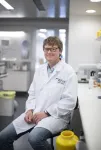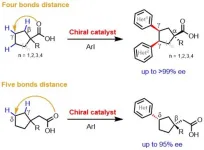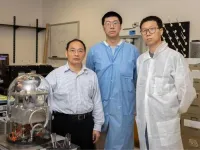(Press-News.org) WEHI division head and pioneer of ubiquitination Professor David Komander has been elected a Fellow of the esteemed Royal Society, the UK’s national science academy.
Prof Komander was recognised for his significant research contributions towards understanding ubiquitin, the ‘kiss of death’ protein which tells our cells which proteins to break down or recycle – a vital process that helps cells stay healthy and function correctly. Prof Komander’s work has helped unravel the ‘ubiquitin code’ that enables ubiquitin to perform many additional cellular functions.
He is one of only five from Australian institutes and 94 people worldwide to be elected to the Royal Society in 2024.
At a glance
WEHI’s Prof David Komander has been elected a Fellow of the Royal Society, the UK’s national science academy.
Prof Komander is a leader in the field of ubiquitination, a process by which proteins in our cells are ‘tagged’, to expand their functionality, or to lead to their organised destruction, which are important to keeping our cells healthy.
His findings have transformed our understanding of the ‘ubiquitin code’, unlocked new research areas and led to drug discovery projects for conditions including Parkinson’s disease, inflammation and cancer.
Prof Komander joined WEHI in 2018 to start the first ubiquitin-focused research division in Australia, following a career in structural biology and biochemistry in Germany and the UK.
He is credited for uncovering how broad and important the ubiquitin system is, highlighting the power of ubiquitin signalling, and for helping to unravel fundamental discoveries in a variety of research fields.
Prof Komander said he was grateful and humbled to be elected a Fellow of the Royal Society.
“Having grown up scientifically in the UK, I have seen first-hand what impact the Fellowship had on some of my mentors, leading to some fresh focus on the big picture and the big questions,” he said.
WEHI director Professor Ken Smith said joining the Royal Society and its 350-year legacy of advancing science was a wonderful recognition of Prof Komander’s achievements.
“For almost two decades, David has dedicated his career to untangling different ubiquitin signals and pathways, growing our collective understanding of this critical cellular process,” said Prof Smith.
“David is an exemplary researcher who leads a globally recognised ubiquitin lab, and a highly regarded member of our team here at WEHI.
“We could not be more proud of all he has achieved – and the discoveries yet to come.”
Prof Komander’s work has uncovered new drug targets for neurodegenerative diseases, significantly expanding our understanding of Early Onset Parkinson’s Disease and its link to two key proteins: PINK1 and Parkin.
In 2021, Prof Komander’s team produced a ‘live action’ view of PINK1 which showed how the protein progresses from when it is initially made, to being activated and functional. The work provided fundamental insights into Parkinson’s disease.
His work on PINK1 and Parkin has also paved the way for developing therapeutic agents that can ‘switch on’ these proteins to eventually treat Parkinson’s disease – an incurable condition that affects an estimated 220,000 Australians.
Molecular ‘kiss of death’
Prof Komander’s research focuses on a form of protein modification called ‘ubiquitination’ which affects a wide range of diseases including cancer, inflammatory diseases, Parkinson’s disease and COVID-19.
When proteins are ubiquitinated (modified with a ubiquitin ‘tag’), they are usually quickly destroyed by large cellular machines that disassemble the proteins.
This ‘kiss of death’ is an essential part of life and health, ensuring broken proteins are removed from circulation and signals in the body are transmitted.
This process is critical to removing unwanted or damaged proteins, and it can trigger inflammation and stress when it goes awry. Such cellular stress can lead to disease.
Importantly, ubiquitination comes in many forms, forming a complex signalling ‘code’. This code is used by all cells to move proteins within them, to change their interactions and to signal changes in the cellular environment.
Unravelling this ubiquitin code is the mission of Prof Komander, one which he has contributed significantly to along his research career.
For example, Prof Komander discovered and named OTULIN, an enzyme that plays important roles in regulating the immune system's response to infection and inflammation, when at Cambridge in 2013.
The discovery led to the identification of a severe autoinflammatory disease, which has been named OTULIN-related autoinflammatory syndrome – or ORAS.
Research leaders and Royal Fellows
Prof Komander joins a growing list of exemplary WEHI scientists to be elected a Fellow of the Royal Society, including past institute directors Professor Suzanne Cory AC, Sir Gus Nossal AC, Sir Frank Macfarlane Burnet and Dr Charles Kellaway.
He joins Professor Jane Visvader and Professor Alan Cowman AC as current members of staff who are Royal Society Fellows.
Prof Komander, who was elected a Fellow of the Australian Academy of Science in 2023, said there remains much to learn in ubiquitin research, making it an exciting time to be in the lab.
“I am really grateful to the many people I worked with, at all stages of my career, that have impacted me as a scientist,” he said.
“In my labs in Cambridge and now WEHI, I have been lucky to work with incredibly smart and talented researchers, and I thank them all for their enthusiasm, intelligence and creativity.
“I am especially indebted to my advisors, especially Dario Alessi FRS and David Barford FRS, for their continued support, and to the WEHI community who have warmly welcomed me since 2018.”
END
Ubiquitin trailblazer elected Fellow of prestigious Royal Society
2024-05-17
ELSE PRESS RELEASES FROM THIS DATE:
A new ‘rule of biology’ may have come to light, expanding insight into evolution and aging
2024-05-17
By Darrin S. Joy
A molecular biologist at the USC Dornsife College of Letters, Arts and Sciences may have found a new “rule of biology.”
A rule of biology, sometimes called a biological law, describes a recognized pattern or truism among living organisms. Allen’s rule, for example, states that among warm-blooded animals, those found in colder areas have shorter, thicker limbs (to conserve body heat) than those in hotter regions, which need more body surface area to dissipate heat.
Zoologist Joel Allen formulated this idea in 1877, and though he wasn’t the first or the last to present a rule of biology, his ...
Scripps Research chemists develop new method for making gamma chiral centers on simple carboxylic acids
2024-05-17
LA JOLLA, CA—Scripps Research chemists have accomplished a long elusive feat in synthetic chemistry: the invention of a broadly useful method for constructing “gamma chiral centers” on simple starting compounds called carboxylic acids. The method, published on May 16, 2024 in Science, significantly extends the ability of chemists to build and modify complex pharmaceutical molecules and other valuable chemical products.
The term chiral refers to a type of asymmetry that allows some chemical compounds to exist in left-handed and right-handed forms. Often, only one of these forms has the ...
2024 SIAM Annual Meeting (AN24) with online component including SIAM Conference on Discrete Mathematics (DM24) and the SIAM Conference on Applied Mathematics in Education (ED24)
2024-05-16
The SIAM Annual Meeting provides a broad view of the state of the art in applied mathematics, computational and data science, and their applications through invited presentations, prize lectures, minitutorials, minisymposia, contributed presentations, and posters. END ...
Detecting influence campaigns on X with AI and network science
2024-05-16
In the age of generative-AI and large language models (LLMs), massive amounts of inauthentic content can be rapidly broadcasted on social media platforms. As a result, malicious actors are becoming more sophisticated, hijacking hashtags, artificially amplifying misleading content, and mass resharing propaganda.
These actions are often orchestrated by state-sponsored information operations (IOs), which attempt to sway public opinion during major geopolitical events such as the US elections, the Covid-19 pandemic, and more.
Combating ...
Offering both colonoscopy and at-home tests doubled colorectal cancer screening
2024-05-16
The rate of colorectal cancer screenings more than doubled when patients were given a choice between which type of screening they wanted—a take-home kit or colonoscopy—compared to those who were only offered the colonoscopy, according to new research led by the Perelman School of Medicine at the University of Pennsylvania. Facilitated through a community health center in which about half of patients had Medicaid insurance, the study—published in Clinical Gastroenterology and Hepatology—provides insights about how to boost screenings among groups ...
A powerful tool speeds success in achieving highly efficient thermoelectric materials
2024-05-16
HOUSTON, May 16, 2024 – Thermoelectric materials could play an important role in the clean energy transition, as they can produce electricity from sources of heat that would otherwise go to waste without generating additional greenhouse gases or requiring large up-front investment. But their promise has been slowed by the fact that most current thermoelectric materials don’t efficiently produce enough power to be useful for many practical applications.
The search for new, more efficient materials involving complex chemical ...
Oropharyngeal cancer staging health record extraction using AI
2024-05-16
About The Study: The results of this study suggest that artificial intelligence may be associated with enhanced patient care and oncological decision-making in patients with oropharyngeal squamous cell carcinoma through detection of localized versus advanced cancer stages. Further model refinement and external validation with electronic health records at different institutions are necessary to improve algorithm accuracy and clinical applicability.
Corresponding Author: To contact the corresponding author, Antoine Eskander, M.D., email antoine.eskander@mail.utoronto.ca.
To access the ...
Airborne technology developed at USC brings new hope to map shallow aquifers in Earth’s most arid deserts
2024-05-16
Water shortages are expanding across the Earth. This is particularly acute in desert areas of the Middle East that are subject to both drought and extreme conditions such as flooding. As a result of these uncertainties, there is an increasing reliance on shallow aquifers to mitigate these shortages. However, the characteristics of these aquifers remain poorly understood due to the reliance on sporadic well logs for their management.
To address this challenge a team of researchers at the USC Viterbi School of Engineering Ming Hsieh Department of Electrical and Computer Engineering along with collaborators ...
Mount Sinai experts to present new research on preeclampsia, preterm birth, doula care and more at the 2024 ACOG Annual Clinical and Scientific Meeting
2024-05-16
Women’s health experts from the Raquel and Jaime Gilinski Department of Obstetrics, Gynecology and Reproductive Science at the Icahn School of Medicine at Mount Sinai will present new research at the 2024 American College of Obstetricians and Gynecologists (ACOG) Annual Clinical and Scientific Meeting in San Francisco from May 17–19. Please let me know if you would like to coordinate an interview about their forthcoming presentations. Mount Sinai obstetricians and gynecologists are also available to comment on breaking news and other trending topics on prenatal care and women’s ...
Normothermic perfusion system extends life of organs waiting for transplant
2024-05-16
In the United States, about 30-40% of donor hearts aren't considered for transplant due to inadequate function in the donor.
This creates a drop in the number of donated hearts that are available to be matched with someone who needs a heart transplant.
A team at University of Michigan Health led by Alvaro Rojas-Pena, M.D., a research investigator with the section of transplantation surgery at University of Michigan Health has spent the past eight years looking at better ways to transport organs for donation, specifically hearts, to improve the number of organs ...



